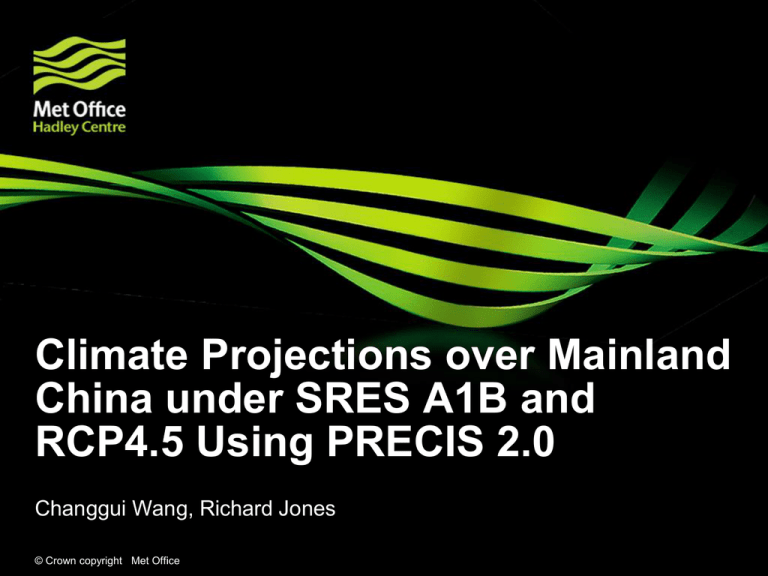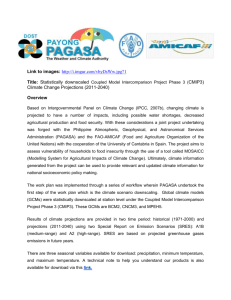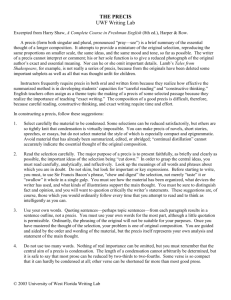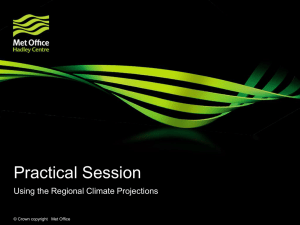PRECIS2.0_IJC_RJ
advertisement

Climate Projections over Mainland China under SRES A1B and RCP4.5 Using PRECIS 2.0 Changgui Wang, Richard Jones © Crown copyright Met Office Climate projection over mainland China under SRES A1B and RCP4.5 using PRECIS 2.0 • Background and Objectives • PRECIS 2.0 model description • Model configuration for providing regional climate projection over China • Model evaluation - present and future climate over China from downscaled QUMP and Hadgem2-ES • Conclusion • Further development of the system - PRECIS 2.1 © Crown copyright Met Office Climate projection over mainland China under SRES A1B and RCP4.5 using PRECIS 2.0 Background and Objectives: • GCMs provide information which is often too coarse for applications • To provide the best possible regional information available for downstream applications: • The full range of simulated climate changes from GCMs • Information relevant to applications which accounts for this range of possible future climate changes, such as “Adaptation Climate Change in China” project • Address major uncertainties in simulated broad-scale climate changes come from global climate models as well as emission scenarios • Enable PRECIS system to downscale the Hadley Centre CMIP5 GCM (HadGEM2-ES) –PRECIS 2.0 © Crown copyright Met Office Climate projection over mainland China under SRES A1B and RCP4.5 using PRECIS 2.0 PRECIS 2.0 model description • PRECIS 2.0 is an updated version of PRECIS RCM system, at heart of which is HadRM3P (Jones et al., 2004) • It implements a hydrostatic version of the full primitive equations to representing atmospheric dynamics (Gordon et al., 2000) • Land-surcace processes – MOSESII (Essery, 2003) • Sulphur cycle (Collins et al., 1997) • Parameterisation of some physical processes: cloud, precip. Radiation, BL and gravity wave drag etc • Finer resolution (50-25km) • Driven at its boundaries by a GCM, the newly introduced GCM is HadGEM2-ES • Sea surface status can be updated using SST/ICE from couple GCMs © Crown copyright Met Office Climate projection over mainland China under SRES A1B and RCP4.5 using PRECIS 2.0 Model configuration for providing regional climate over China • Boundary conditions: Selected HadCM3 PPE members (SRES A1B) and HadGEM-ES RCP4.5 (CMIP5) • HadCM3 PPE (3.75x2.5): hydrostatic, developed from HadCM3 and used for quantifying uncertainty in model prediction (QUMP). The downscaling subset is Q0, Q1, Q8, Q10 and Q13 for East Asia region • HadGEM2-ES (1.875x1.25) is a non-hydrostatic atmospheric dynamic model and was designed to provide simulations for CMIP5 • Model domain • Knowledge sharing – one of the ACCC project objectives • Contribution to CORDEX • CORDEX E. Asia domain is chosen for PRECIS 2.0 evaluation © Crown copyright Met Office Climate projection over mainland China under SRES A1B and RCP4.5 using PRECIS 2.0 Model configuration for providing regional climate over China • The RCM was setup to run 141 years initialised from 1959 towards 2099 • Initial conditions from interpolated from GCM fields • LBC: 6 hourly driving fields: winds (U.V), T, Q and surface pressure • Surface conditions: sst/ice from Hadgem2-ES • MOSEII land surface exchange scheme RCM info: 50km (grid length=0.44) resolution model domain Non-rotated polar RCM © Crown copyright Met Office Rotated polar RCM Corner position longitude latitude longitude latitude Top left corner 57.38 58.0 Top left corner 315.56 49.28 Top right corner 177.98 56.5 Pole 295.22 77.61 Bottom right corner 74.83 -21.19 nx=219 ny=183 Bottom left corner 162.86 -22.37 Number of grid points Climate projection over mainland China under SRES A1B and RCP4.5 using PRECIS 2.0 Model evaluation: • China region characteristics: temperature difference in winter and summer and also change from region to region due to it size and landscape variability. • To evaluate climate trend over China, the CORDEX region is divided into 6 subregions: NW, Tibet, CENTRAL-n, Central-S, NE and SW © Crown copyright Met Office Climate projection over mainland China under SRES A1B and RCP4.5 using PRECIS 2.0 Model evaluation: present temperature climate • Spatial distribution of temperature compared with CRU data set. PRECIS 2.0 simulations agree with observed climate in capturing large scale patterns and provides more realistic detailed variations • Distinct features exhibited: cold bias over Tibet, warm bias in SW and Central-S • Downscaled HadGEM2-ES simulations agree with downscaled HadCM3 PPE and corrected cold bias appeared in the GCM, such as Central-S, Central-N, NW • The formulation of HadRM3P in PRECIS 2.0 RCM plays a dominant role in determining surface climatology © Crown copyright Met Office Climate projection over mainland China under SRES A1B and RCP4.5 using PRECIS 2.0 Model evaluation: present precipitation climate • Spatial distribution of precipitation compared with CRU data set. PRECIS 2.0 simulations agree with observed climate in capturing large scale patterns and provides more realistic detailed variations but featuring gridscale “noise” • Distinct features: wet bias presented in HadCM3 is reduced except Central-S where seems to be enhanced; dry area seemed to simulated more realistically in PRECIS 2.0, but SW tend to show dry bias • Downscaled HadGEM2-ES seems to correct the HadGEM2-ES’s wet biases over Southern, southeastern China, northern region towards Central part for all seasons but it introduced much drier climate over Eastern and NE China during JJA • The formulation of HadRM3P in PRECIS 2.0 RCM plays a dominant role in determining surface climatology © Crown copyright Met Office Climate projection over mainland China under SRES A1B and RCP4.5 using PRECIS 2.0 Model evaluation: annual cycle of T and Precip (baseline) Downscaled HadCM3 PPE: • T: Consistent with GCMs and CRU with improvement but cold bias over Tibet and enhanced warm bias over North and N-W • Precip: downscaled results generally follow the GCMs with improvement, showing wet bias corrections in most regiona. Exceptions include Tibetm, E, SW during djf and C-S in mam © Crown copyright Met Office Climate projection over mainland China under SRES A1B and RCP4.5 using PRECIS 2.0 Model evaluation: annual cycle of T and Precip (baseline) Downscaled HadGEM2-ES: • T: Consistent with GCMs and CRU with improvement but cold bias over Tibet and enhanced warm bias over C-S • Precip: downscaled results generally follow the GCMs with improvement, showing wet bias corrections in most region. Exceptions include Tibetm, E, SW during djf and C-S in mam © Crown copyright Met Office Grey bar –CRU; dash lines – HadGEM2-ES GCM; dotted linesdownclaed HadCM3 PPE mean; solid lines – downscaled HadGEM2-ES Climate projection over mainland China under SRES A1B and RCP4.5 using PRECIS 2.0 Model evaluation: Temporal trend and future projections • T: overall 0.26/decade for present day, noticeable changing points in 1960,1970 and 1980. By the end of 21st Century, projected T is in order of 3-4.5oC in South and 4-6 in North • Precip: a clear interannual change, generally shows either increase or decrease before 2010. The decreasing trend in 1960s is well simulated. Future projections also show large variations but with clear long-term increasing trend © Crown copyright Met Office Climate projection over mainland China under SRES A1B and RCP4.5 using PRECIS 2.0 Model evaluation: Temporal trend and future projections • Precip: increasing trend in North show potential to improve drought condition but variability's continue in the future implies that the droughts are likely to persist there © Crown copyright Met Office Region Obs. Mean (mm/day) Rainfall Change rate (%) PPE ensembles (A1B) Minimum Maximum 2050 2080 2050 2080 2050 2080 2050 2080 0.29 16.34 25.15 40.13 65.10 27.90 41.88 20.36 22.03 Tibetan 1.11 14.35 23.13 30.22 47.59 20.45 32.32 22.58 25.65 CN 0.98 21.40 25.05 39.10 46.01 27.78 36.90 9.06 14.42 CS 3.71 2.82 14.84 22.41 31.04 10.82 21.01 -1.3 7.11 NE 1.48 8.36 11.20 25.85 35.95 16.02 24.78 14.50 11.74 SW 2.63 5.28 14.80 12.56 25.4 8.72 18.24 7.49 9.40 NW Mean Hadgem2-ES RCP4.5 Climate projection over mainland China under SRES A1B and RCP4.5 using PRECIS 2.0 Conclusions & Further work • • • • • This talk demonstrates the capability of new version of PRECIS 2.0 for downscaling one of CMIP5 GCM (HdGEM2-ES) It includes HdCM3 PPE thus provide uncertainty in these projections and information relevant to assessing climate change impacts and adaptations over China. Both downscaled HdCM3 PPE and HadGEM2-ES are generally captured broad spatial, annual variations observed DownscaledHadCM3 PPE and HadGEM2-ES simulate a wide range of plausible future climate changes for precipitation, where significant seasonal and geographical variability is seen in the spatial and temporal distribution a wider range of possible future conditions related to rainfall is simulated, e.g. allowing for both continued drought conditions and enhanced flood risk © Crown copyright Met Office Climate projection over mainland China under SRES A1B and RCP4.5 using PRECIS 2.0 Conclusions & Further work • The lower temperature trends in the downscaled HadGEM2-ES projections than in the corresponding HadCM3 PPE driven projections is consistent with the lower greenhouse gas emissions/concentrations present in the RCP4.5 compared to the SRES A1B scenario. • The results provide some indication of the range of expected temperatures given uncertainty in both the modelling and future emissions • The further work on PRECIS will enable more CMIP5 GCM members to be downscaled in the system, such as CNRM, GFDL, CSIRO and IPSL etc • A new release PRECIS 2.1 should be expected in next year. © Crown copyright Met Office Questions? A scientific paper entitled “Climate projection over mainland China under SRES A1B and RCP4.5 using PRECIS 2.0 (Changgui Wang, Richard Jones et al.) ” has been submitted to IJC and is currently under peer review © Crown copyright Met Office










